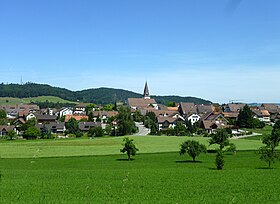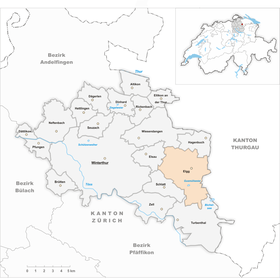Elgg
| Elgg | |
|---|---|
| State : |
|
| Canton : |
|
| District : | Winterthur |
| BFS no. : | 0294 |
| Postal code : | 8353 Elgg 8354 Dickbuch 8354 Hofstetten |
| Coordinates : | 707.76 thousand / 262 071 |
| Height : | 530 m above sea level M. |
| Height range : | 488–890 m above sea level M. |
| Area : | 24.39 km² |
| Residents: | 4903 (December 31, 2018) |
| Population density : | 152 inhabitants per km² |
|
Proportion of foreigners : (residents without citizenship ) |
17.3% (December 31, 2018) |
| Mayor : | Christoph Ziegler ( glp ) |
| Website: | www.elgg.ch |
| Location of the municipality | |
Elgg ( Zurich German [elk] ) is a municipality in the district of Winterthur of Switzerland's canton of Zurich . It is one of the six historic little rural towns in Zurich .
coat of arms
- In red a silver bar, accompanied by three black, gold-tongued bear heads with gold collars (2, 1)

The municipal coat of arms, first documented in 1388, is one of the oldest in the canton. Only the coats of arms of Winterthur (1276), Grüningen (1370), Rheinau (1374) and Zurich (1384) are older.
geography
Elgg is located in the upper Eulachtal , about twelve kilometers east of Winterthur , right on the border with the canton of Thurgau .
history
The name "Elgg" was first mentioned in writing in 760 as Ailaghoga (761/67: Ailihccaugia ) in a deed of donation to the St. Gallen monastery . In 1371 the Habsburg Duke Leopold III. town rights to the place. In 1442 Herdegen von Hinwil bought the Elgg castle and estate; his family determined the fate of the community for the next 130 years, with the citizens being granted certain rights such as the election of three councilors. In 1512 the reign of Pope Julius II received a valuable « Julius banner » for the services rendered in the «Great Pavierzug» in 1508–1510 to expel the French.
After various other changes of ownership in 1712 Major General Hans Felix Werdmüller bought the Elgg jurisdiction from the then owner Herkules von Salis-Marschlins. The Werdmüller family still owns Schloss Elgg - since 1715 as Fideikommiss of the “Werdmüller von Elgg” - today. In the course of the Helvetic Revolution in 1798, the Werdmüllers renounced all judicial rights, and Elgg has belonged to the Canton of Zurich ever since. In the then Helvetic Republic , Elgg was constituted as a so-called municipal municipality , consisting of the political municipality of Elgg and the civil municipality of Elgg . After several attempts, the civil parish was abolished in 1990.
In 1876 a major fire destroyed half the town (42 residential buildings, 47 utility buildings, etc.), which was then rebuilt.
On January 15, 2017, the voters in Hofstetten and Elgg decided that the previously independent political municipality of Hofstetten will be part of the municipality of Elgg from 2018.

population
| Population development | |
|---|---|
| year | Residents |
| 1634 | 1018 |
| 1792 | 2103 |
| 1836 | 1038 |
| 1850 | 1182 |
| 1900 | 1420 |
| 1950 | 2184 |
| 2000 | 3593 |
| 2005 | 3700 |
| 2010 | 3897 |
| 2018 | 4821 |
politics
The municipal council , the executive branch of the municipality, consists of 5 representatives and 2 representatives from the following parties (as of 2020): Local party «soso, elgg»: 3 (including mayor Christoph Ziegler / glp ), SVP : 3, FDP : 1.
In the 2019 National Council elections, the electoral share in Elgg was: SVP 36.87%, SP 13.65%, glp 13.58%, FDP 11.29%, Greens 10.28%, EPP 5.78%, CVP 3.60 %, EDU 2.25%, and BDP 1.38%.
economy
traffic
Elgg is served every hour by the S 35 Winterthur - Wil of the S-Bahn Zurich , which is operated by the Thurbo regional train. Since December 2018 , the S 12 Brugg - Altstetten - Zurich HB - Stadelhofen - Winterthur - Schaffhausen / Wil line has been serving the Elgg station every hour as part of the 4th partial additions to the Zurich S-Bahn . From this point on, several Postbus lines operate:
680 Elgg - Hofstetten ZH - Schlatt ZH - Elsau - Winterthur
681 Elgg, train station - Elgg, village - Hagenbuch ZH
682 Elgg - Hofstetten ZH - Oberschlatt - Girenbad (only runs on weekends)
The Matzingen, Oberwinterthur and Attikon motorway connections and the A1 and A7 motorways can be reached within a few minutes.
Churches
There are two churches in Elgg:
- The Reformed Church of Elgg, originally St. Georg , is of national importance because of its wall paintings.
- The Catholic Church of St. George dates back to 1982 and has modern works of art and a. by Willi Buck (1911–1997), Christof Zünd (1936–2012) and José de Nève (* 1933).
Arts and Culture
Attractions
The village center, which comprises four main streets with half-timbered houses and Lindenplatz, is well worth seeing. This is also where the most important building in the small rural town of Zurich can be found, the late Gothic church from 1516, renovated in 2003/2004 and adorned with significant wall paintings. Century. Elgg Castle, enthroned above the village, dates back to a castle from the 12th century and has belonged to the private family foundation of the Werdmüller von Elgg for centuries.
A museum in one of the old wine trots on the Humberg presents old handicrafts that had tradition in the town, such as comb-making, pewter-making and furnace construction.
regional customs
Every year on Ash Wednesday, the residents maintain the historical custom of “Äschli”. This is a parade of school-age boys in historical clothing, which is reminiscent of the former military pattern and was first celebrated at the beginning of the 16th century.
The so-called “forest walk” has also been carried out every year at the beginning of summer for centuries. The annual Klausmarkt takes place on the Friday before December 6th. From April to the beginning of December every Saturday is market day with fresh products, most of which come from Elgg and the surrounding area.
Sports
FC Elgg, founded in 1922, played in the second division in the 1995–1997 seasons (at that time the fourth highest Swiss league). The 1st team has been playing in the 3rd division since the 2015 season.
In the higher leagues, on the other hand, the FB Elgg fistball club or the «Elgg-Ettenhausen» syndicate, which plays in the National League A.
The floorball club Elgg (UHC Elgg) currently (2019) plays in the 2nd division.
There is also a gymnastics club, a ladies gymnastics club, a tennis club, a riding club, a shooting club, a floorball club and other sports clubs in the village.
literature
- Ueli Müller: Elgg. In: Historical Lexicon of Switzerland .
- K. Hauser: History of the city, rule and community of Elgg. H. Büche printing house, Elgg 1895.
- Ulrich Beringer: The great fire of Elgg on July 9th, 1876. A souvenir sheet. Elgg 1926.
- Karl Mietlich: History of the city, rule and community of Elgg. Volksverlag, Elgg 1946.
- Hans Martin Gubler: The art monuments of the canton of Zurich. Volume 7: The Winterthur district. Southern part. Edited by the Society for Swiss Art History GSK. Bern 1986 (Kunstdenkmäler der Schweiz 76), ISBN 3-7643-1786-8 , pp. 282–417.
- Helmut Jaeckel, Conrad Schneider: Elgger life Elgg experience. Obergass, Winterthur 2006, ISBN 978-3-033-00796-3 .
- Markus Stromer: History of the rural town of Elgg. Chronos, Zurich 2010, ISBN 978-3-0340-1053-5 .
Web links
- Official website of the municipality of Elgg
- Statistical data from the canton on the municipality of Elgg
- Office for Spatial Development, Canton Zurich: Archeology in Elgg - Prehistory
- Office for Spatial Development, Canton of Zurich: From Elgg to Zell
Individual evidence
- ↑ Permanent and non-permanent resident population by year, canton, district, municipality, population type and gender (permanent resident population). In: bfs. admin.ch . Federal Statistical Office (FSO), August 31, 2019, accessed on December 22, 2019 .
- ↑ Data on the resident population by home, gender and age (community profile). Statistical Office of the Canton of Zurich, accessed on December 22, 2019 .
- ↑ How the community got their coat of arms. In: The Landbote . June 22, 2017. Retrieved September 21, 2018 .
- ↑ Compare - also on the unresolved name interpretation - Lexicon of Swiss Community Names , ed. from the Center de Dialectologie at the University of Neuchâtel under the direction of Andres Kristol, Frauenfeld 2005, p. 318 f.
- ↑ Winfried Hecht: The Julius banner of the town facing Rottweil. In: Der Geschichtsfreund: Messages from the Central Switzerland Historical Association . 126/7 (1973/4). doi : 10.5169 / seals-118647
- ↑ The whole section after Markus Stromer: History of the rural town of Elgg.
- ↑ Reto Flury: Community mergers: Elgg swallows Hofstetten . In: Neue Zürcher Zeitung . January 15, 2017, ISSN 0376-6829 ( nzz.ch [accessed January 22, 2017]).
- ↑ Elections 2019. Accessed May 23, 2020 .
- ↑ Roland Böhmer: The Reformed Church of Elgg. (= Swiss Art Guide, No. 849, Series 85). Edited by the Society for Swiss Art History GSK. Bern 2009, ISBN 978-3-85782-849-2 .
- ^ Website of the Ash Wednesday Society: The story of the Äschli
- ↑ The Elgger custom «Äschli» on the municipality website




